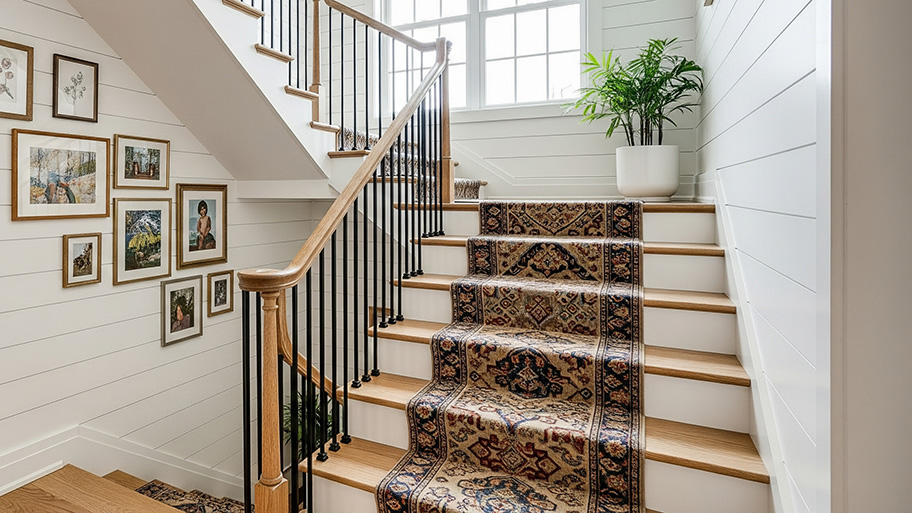
Discover stair repair cost estimates, including average prices, key cost factors, and tips to help you budget for your stair repair project.
Sometimes, a do-it-yourself project can cost you more than hiring a pro, leading to an empty wallet and a major headache. Learn how to avoid common pitfalls and actually save money on your next project, with advice from homeowners and pros.


You're handy, you're resourceful, and you love the idea of saving a buck. Tackling that home improvement project yourself seems like a no-brainer, right?
Millions of homeowners embrace do-it-yourself with the best intentions, whether it's to cut costs, learn a new skill, or simply enjoy the process. But according to our recent Angi survey, 25% of homeowners end up hiring a pro to fix or complete their DIY project. About 86% of these projects end up costing more than expected.
Thankfully, you can save yourself a headache—and lessen the burden on your wallet—by doing your research and understanding your limitations. Learn how to keep DIY costs down, with tips from real homeowners and professional service people alike.
For starters, it helps to understand why people tackle home projects on their own. Angi’s research report surveyed 750 homeowners who attempted a DIY renovation or home improvement project in the past five years and 447 professional service people.
According to the results, here's what motivates homeowners to DIY:
71% of surveyed homeowners take on DIY projects to save money
53% attempt DIY if the project seems doable
28% think DIY projects are fun
21% want to learn new skills through DIY
Homeowners sign up for a wide range of interior and exterior home tasks. In our survey, the most popular DIY projects were regular maintenance, painting and staining, landscaping, removing or trimming trees, installing shelving, and plumbing work.
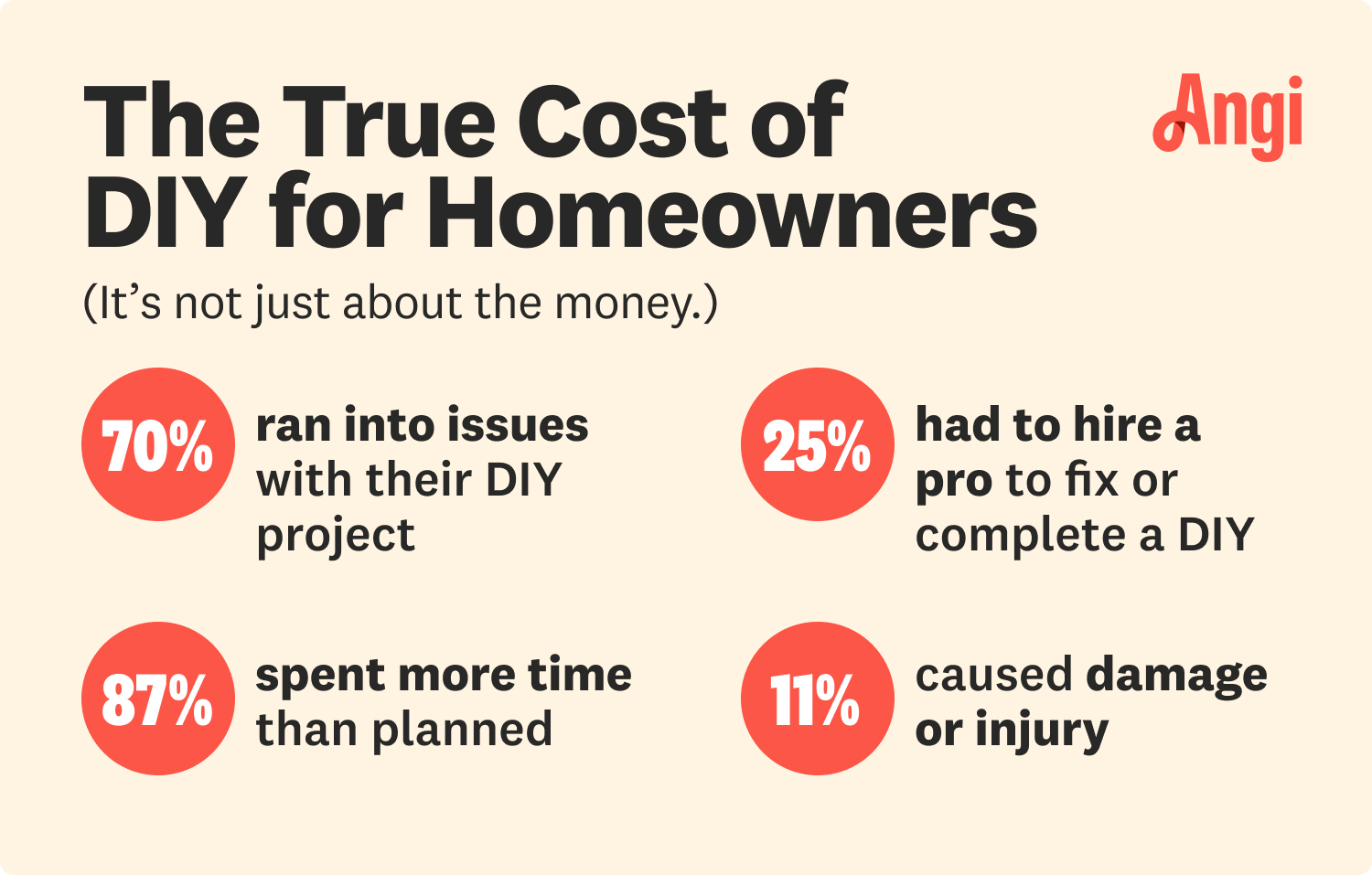
Unfortunately, DIY doesn’t often go down without a hitch. About 70% of surveyed homeowners have experienced issues with their DIY projects. The most common problems include:
Not having a necessary tool
Making incorrect measurements
Breaking something
Becoming too overwhelmed
According to one homeowner, "The biggest issue is when you get halfway through and then realize you can't do it yourself, you need to hire someone to finish, and they can't get you into the schedule for 6 weeks, and then you have a half-finished project you have to live around for the next six weeks."
Another homeowner claimed their setback was "not having the right tools," while others lamented about "running out of motivation" and "unexpected situations that you don't plan for, like uneven flooring." One survey respondent claimed they’ve "tried to fix a problem myself and made another one."
DIY setbacks can also be downright dangerous. An Angi survey found that 11% of homeowners caused home damage, injury, or safety hazards when attempting a DIY project. If you’re unsure how to accomplish a project safely, it’s best to hire a pro.
Sometimes these mishaps are only minor inconveniences. Other times, however, they can deplete your savings fund. The Angi survey found that 25% of homeowners hired a professional to fix or complete the home project they attempted, and 90% of surveyed pros have been called to repair a project that homeowners had attempted by themselves.
Of the homeowners who hired pros, 86% ultimately spent more than they originally planned. The average amount of additional fees? A whopping $862! It makes sense that a majority of these people (55%) regret attempting the project on their own.
Homeowners end up hiring a professional to mend their DIY attempts—and therefore spend more than they intended—for a variety of reasons. Many of the hardships come from improper preparation work, a lack of DIY knowledge, or taking on projects that are too complex.
The majority of homeowners prepare in some way for a DIY project—about 60% watch YouTube videos, for example, while 54% conduct online research. Others get ready by speaking with friends or family members, bringing questions to professionals or hardware store employees, reading books, or researching on social media.
That said, about 8% reported jumping into the project with absolutely no prep work. Of course, not having a plan or process increases the likelihood of something going wrong.
About 19% of survey respondents said their home projects were "somewhat difficult" or "very difficult." A lack of DIY knowledge could be the reason behind the struggles.
Of the homeowners surveyed, only 5% of homeowners feel they are DIY experts. About one in four identify as being a DIY beginner. Lack of experience makes you more prone to mistakes, especially if you don’t educate yourself before diving in.
According to an Angi survey, the most common home projects that go wrong include drywall repair, plumbing work, electrical repair, and flooring installation. If you are tackling these tasks, make sure you’re informed and prepared.
Complex projects, especially those requiring specialized knowledge, are the most difficult for homeowners. According to the Angi report, the most challenging project types are appliance repair, plumbing work, and electrical work. This makes sense because pros in these fields often require training, licensing, and certification, depending on state and local regulations where they work.
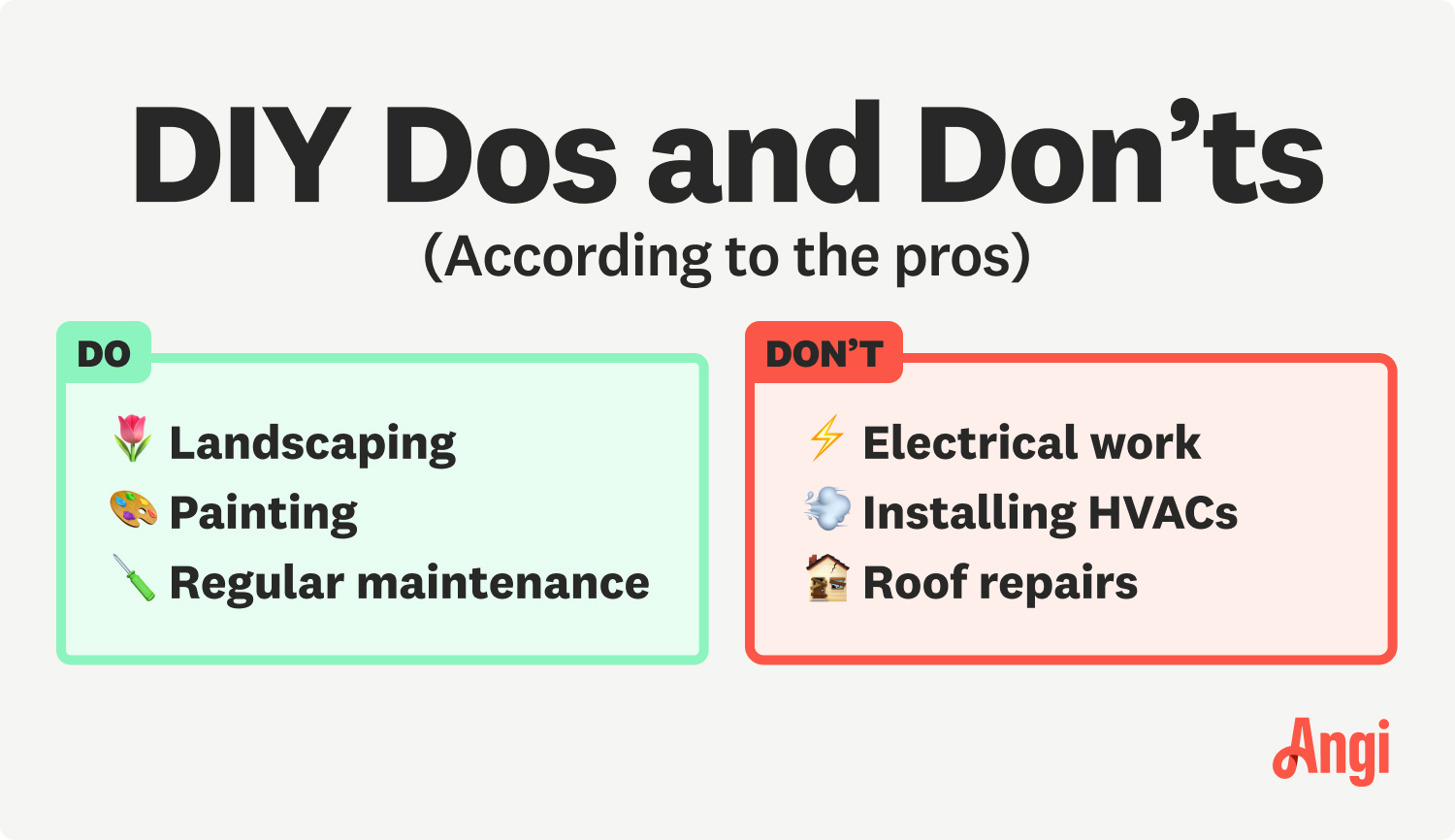
Looking to prevent unexpected fees when attempting a DIY project? Here are some tips from homeowners and pros alike.
Cutting costs often boils down to thorough preparation, which includes diligent planning and continuous learning. Homeowners in our survey advocate for watching videos and consulting online resources. According to one respondent, "Before you start the project, do some research, particularly using YouTube to get advice from experts or see how other people have tackled problems to make sure you have the time and the tools required for the project."
Professionals echo this sentiment. When asked what advice they'd offer prospective do-it-yourselfers, one pro stated, "I will tell them to make sure they do their research before even attempting to start on their projects. It takes a lot of time to learn how to do things correctly." Another pro shared this insight: "Take your time, Rome wasn't built in a day."
It’s also important to understand your skills, limits, and abilities. Don’t overestimate what you can handle. For example, one homeowner said you should "think hard about what you are really capable of doing before you start a new project."
If you don’t know what skills are needed for your task, turn to the pros. "Get advice from professionals, and seek information from multiple sources," suggests one pro. "If something comes with a risk to your health or home, do not attempt this and call a professional to complete the job for you. The cost to have a job done right once is often less than having the lowest bid done over again several times."
Surveyed pros recommend that homeowners leave the following projects to the experts:
Electrical work
Repairing or installing a roof
That said, many pros believe homeowners can successfully complete landscaping projects, painting, and regular maintenance without outside help. Choosing DIY projects wisely can save you a headache, time, and money.
If you’re unsure about a project—or if you’re taking on something complex—consider hiring a professional. It’s "better to hire a professional, pay the fees, and have the job done right the first time," according to one homeowner.
A pro offered this sound advice: "With each project you are thinking of attempting, figure out what could likely go wrong and the resulting cost/damage. If that number is more than you are willing to pay, hire someone instead."
If you need help finding a pro, head to Angi.com.
From average costs to expert advice, get all the answers you need to get your job done.

Discover stair repair cost estimates, including average prices, key cost factors, and tips to help you budget for your stair repair project.
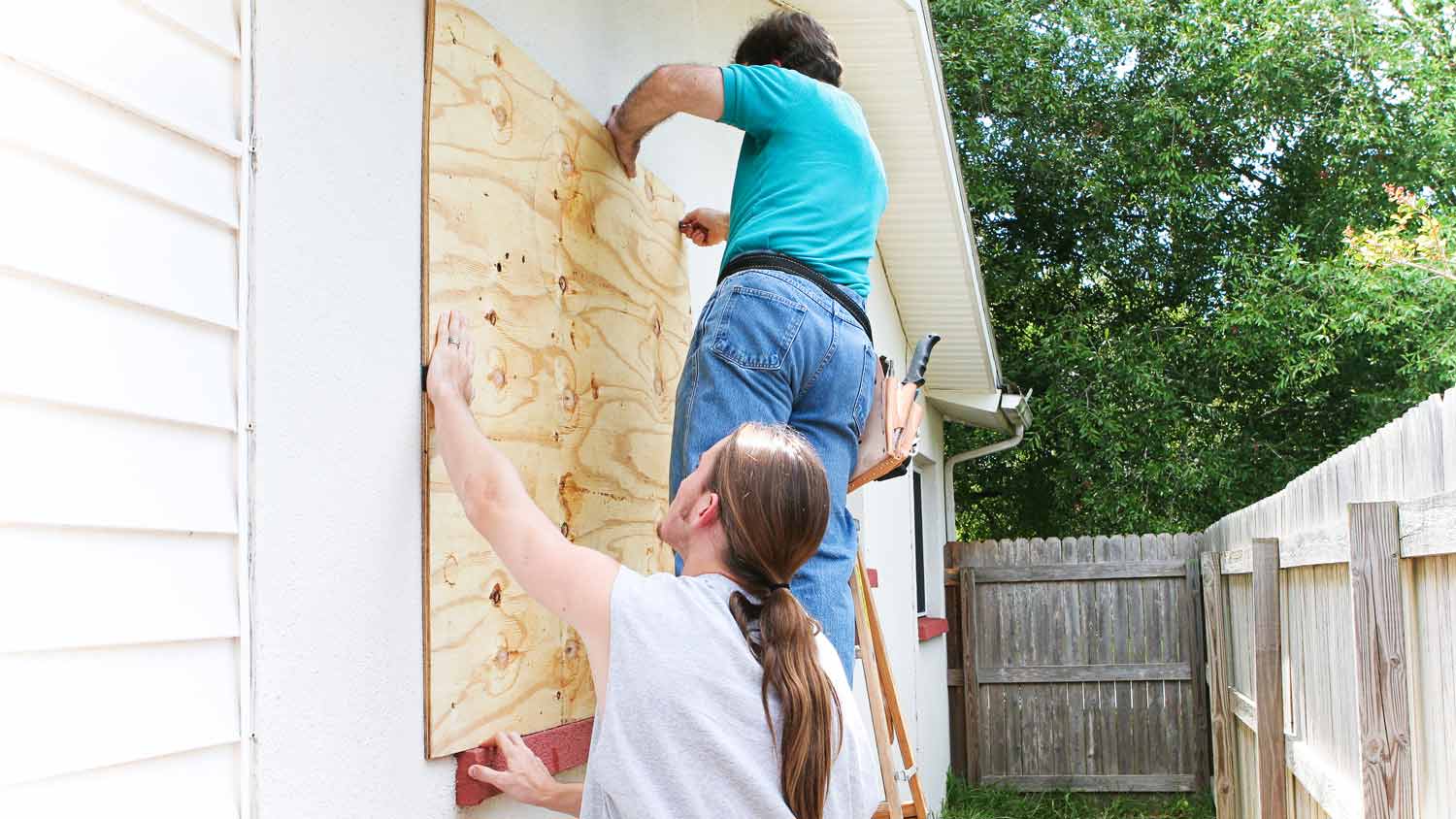
Discover storm damage repair costs, key price factors, and ways to save. Get transparent estimates to plan your home repairs with confidence.

Curious how much general contractors charge per hour? Discover hourly rates, key cost factors, and tips to save on your next home project.

Pneumatic vacuum elevators can boost your home’s accessibility and value. Use this guide to learn how much yours will cost based on factors like features and size.

House construction is a lengthy and expensive project. Learn how to hire a contractor to build a house so they can take on the physical and mental load for you.
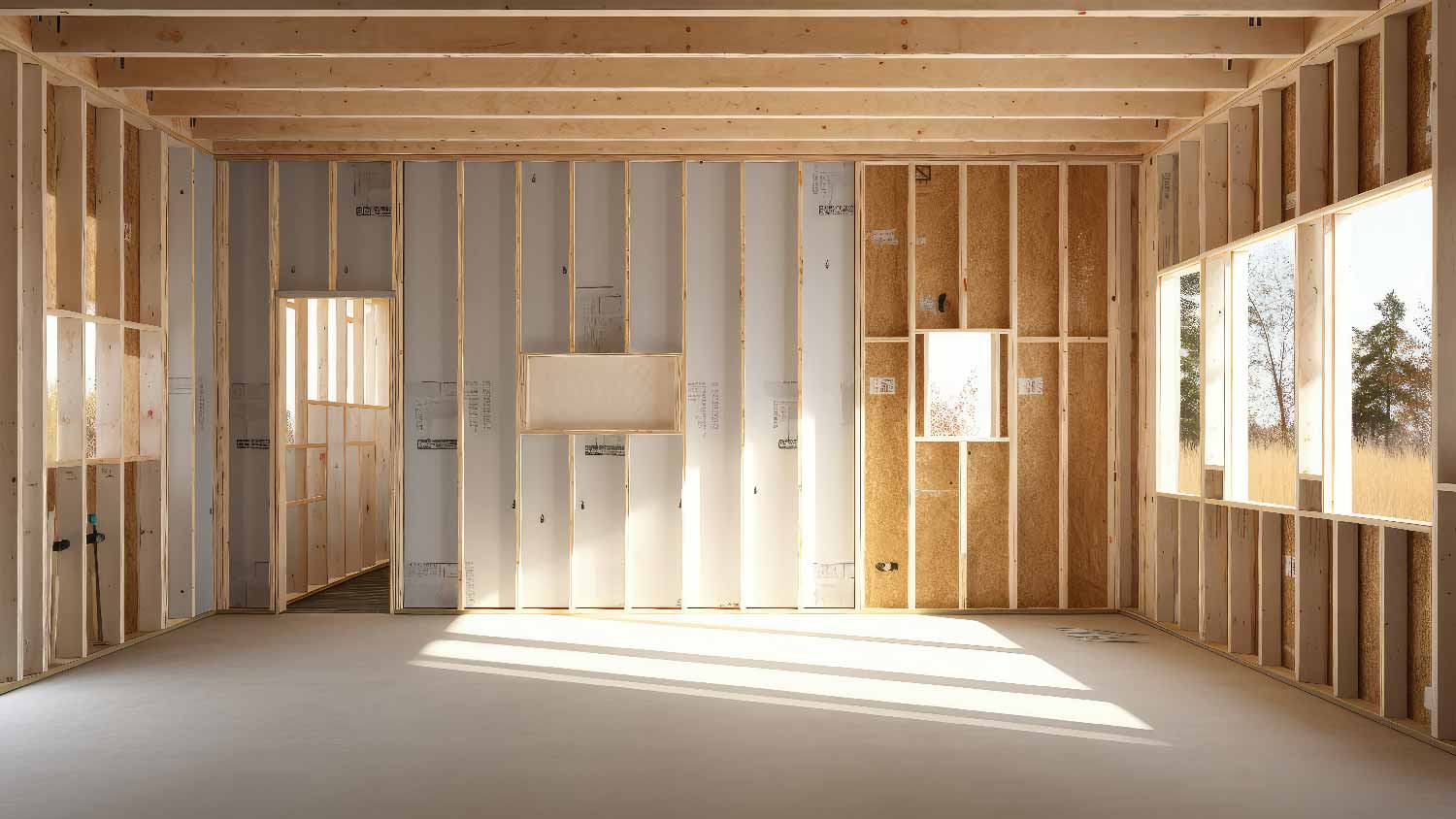
Choosing the type of framing for your home isn't a decision to make lightly. Compare metal studs vs. wood studs to find the best base for your house.